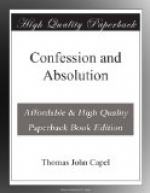Unhappily, it is within our power to hate, to grieve, and to purpose amendment very sincerely, and yet not have that sorrow which fulfills God’s condition for the pardon of sin. Some human motive—such as loss of health or wealth, injury to reputation and influence, the ignominy and servitude of wrong-doing—may lead a man to detestation of the past and to a firm resolve to avoid wrong in the future. Excellent as may be such a change of mind, yet it is not sufficient to obtain forgiveness from on high. It is based entirely on the injury and loss accruing to self. God is excluded from the whole idea; and yet it is against Him, and against Him alone, that we have sinned.
The only sorrow acceptable to God is that which springs from a supernatural motive, the soul excited thereto by divine grace. In this is our utter helplessness shown; for while it is within our own power to do wrong, we cannot return to the path of duty and repent without the help of God. It is by the heavenly gift of grace operating within, and by the co-operation of the sinner, that the heart is made contrite. The remembrance of God’s infinite love and perfections, accompanied by earnest prayer for mercy, may rouse the soul to hatred and grief for its sin, and thus is generated that contrition perfect through charity for having offended God so sovereignly good, who is to be loved above all things. For His own sake, and regardless of the penal consequences of sin, the soul is touched with sincere compunction. This sorrow, with the implicit or explicit desire to have recourse to the Sacrament of Penance, reconciles the soul at once with God, and restores the justifying or habitual grace lost by grievous sin. “There is now no condemnation to those who are in Christ Jesus, who walls not according to the flesh, but after the spirit. For the law of the spirit of life iii Christ Jesus hath delivered me from the law of sin and of death."[21] The soul about to go before God’s judgment-seat, if it be in deadly sin, and have not at hand the means for obtaining absolution, is obliged to have this perfect contrition, or otherwise the sin remains unforgiven.
Again, the soul, contemplating in the sight of God the turpitude of sin, as made known to us by revelation, or the terror of God’s judgment on those condemned to hell, or the irreparable loss of the sight of God consequent on sin, may be excited by fear of Him who hath power to cast into everlasting prison. The soul, awe-stricken by the painful sight of its own guilt, and by the sense of the judgment of God, yet hoping for pardon and resolved to sin no more, makes an initial act of the love of God, and appeals to His goodness for forgiveness. Though the motive is less perfect, yet “He who desireth not the death of the sinner, but that he be converted and live” does in His exceeding mercy accept this as sufficient for pardon, if there be added to it the actual reception of the Sacrament of Penance. In other words, in this case, unless the sinner shows himself to the authorized minister of reconciliation and receives his absolution, there is no pardon.




